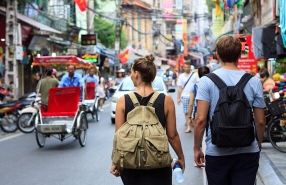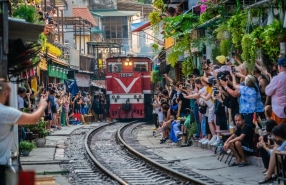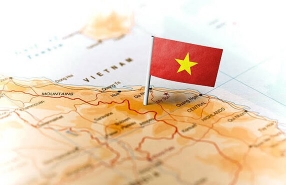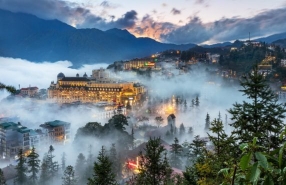What To Do And To See In Sapa ? Visit Lao Chai Ta Van
Monday, June 03, 2024
Places to visit & things to do

When visiting Sapa, tourists often only know about Fansipan Peak, renowned for its majestic mountains and luxurious resorts. However, few are aware that amidst the hustle and bustle of city life, there exist beautiful villages named Lao Chải and Tả Van. Unlike the bustling and lively atmosphere of Sapa, these villages exude a serene and peaceful ambiance, both in nature and among the people. The terraced rice fields stretching across the hills create a breathtakingly beautiful picture. This idyllic spot is perfect for relaxing and immersing yourself in the lush greenery of Sapa's hills. Let's follow Autour Asia to explore Lao Chai - Ta Van village right away!
Table of Contents
1. Overview of Lao Chai - Ta Van villages in Sapa
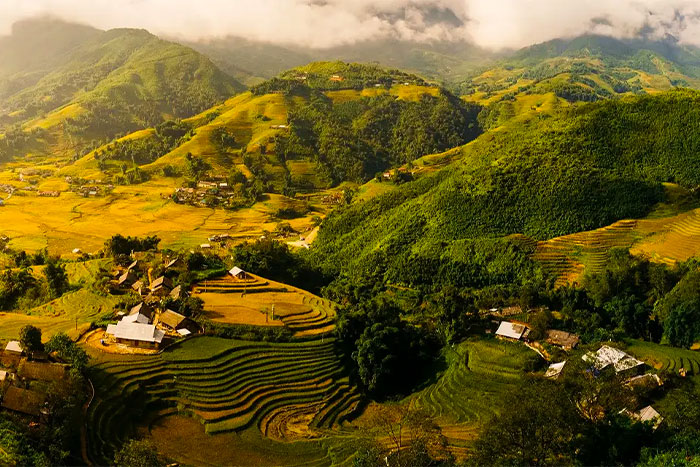
Located about 7-12 km from Sapa town center, Lao Chải is one of the two largest villages in Sapa - Lào Cai. The other village is Tả Van, and these are the two main villages in the Sapa tourist area. Lao Chải and Tả Van have diverse ethnic groups, such as the Black H'Mong, Giay, and Red Dao people. Their traditional homes, closely clustered together, form a unique and picturesque landscape. Nestled against the stunning Hoang Lien Son Mountain ranges, they radiate a tranquil, unspoiled beauty. It is an ideal destination for travelers looking to immerse themselves in authentic cultural experiences amidst serene natural surroundings.
2. What makes Lao Chai - Ta Van villages special ?
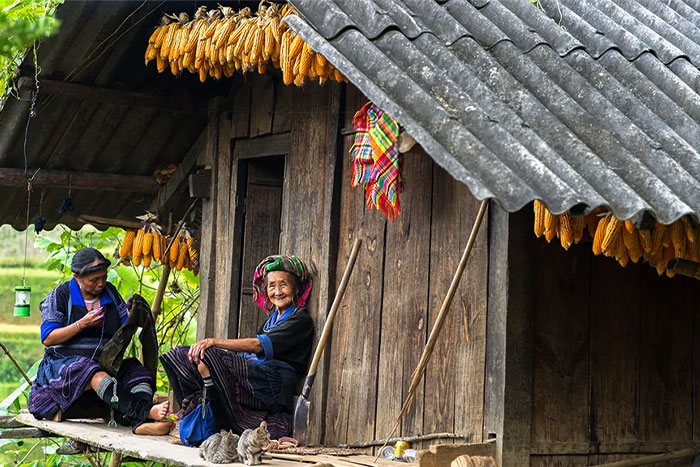
What can you expect when visiting this beautiful village? Lao Chải and Tả Van have a unique charm that leaves a profound impression on visitors.
Upon arriving in these villages, travelers will immediately feel the rustic and pristine beauty of this place. One of the most unique features of them is the terraced fields, the primary method of cultivation for the highland residents. As you explore this area, you can rest your eyes on the picturesque fields of rice, corn, and cassava, covered in beautiful shades of yellow and green.
In addition to its natural beauty, the culture of Lao Chai - Ta Van Village is a harmonious blend of many ethnic minorities living there, offering visitors a fresh and wonderful experience. What captivates travelers every time they enter these villages is the sight of locals in their traditional costumes, which brings a sense of familiarity and warmth.
Take a look at Giang Ta Chai Village
3. When is the ideal time to visit Lao Chai - Ta Van Village?
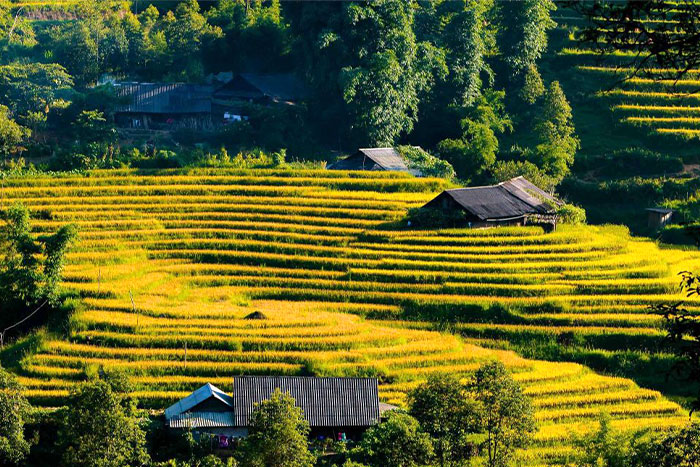
According to locals, these villages are at their most beautiful from September to April of the following year. This is when Sapa has passed the heavy rainy season, which usually occurs in the summer, and the weather starts to transition into autumn, with cool and less rainy conditions, making it more favorable for travel and exploration. For those who want to admire a vast golden carpet of terraced fields - thing that you must see in Sapa during the harvest season, traveling from the end of August to September is an ideal choice. The different patches of rice, undulating and connected, resemble the rising and falling waves of the sea, stretching endlessly.
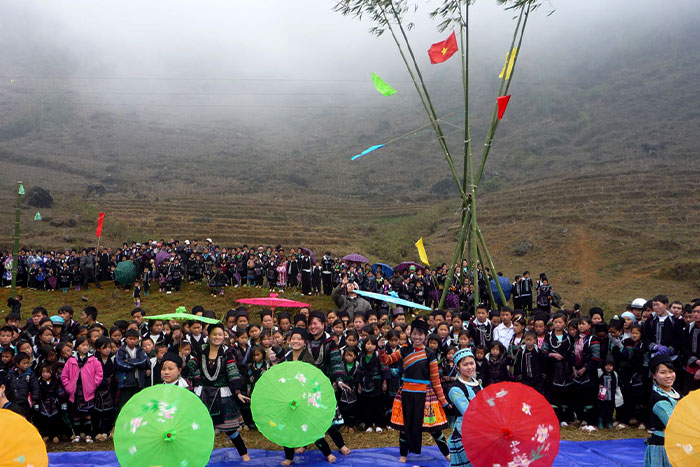
Additionally, these two villages showcase their unique artistic charm in spring (typically from February to April when the weather is cold). During this time, the roads are covered with the pink hues of peach blossoms and the milky white of plum flowers, making the surroundings look like a magnificent, colorful painting. This is also when the local people organize Tet markets, offering many distinctive highland dishes. Both villages host numerous culturally rich festivals, such as the "Roóng Poọc" festival of the Giay people, which takes place in the early days of the year. In the Giay language, "Roóng" means “to go down” and “Poọc” means “field.” "Roóng Poọc" is related to farming activities. The festival reflects the people's wishes for a peaceful life and their hope for the prosperity of their livestock.
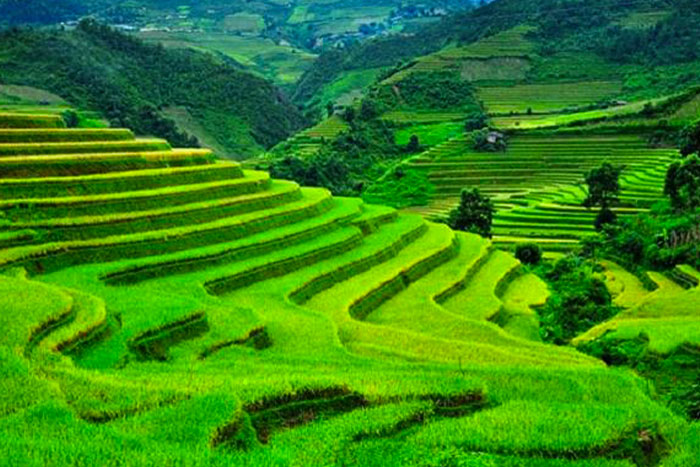
If you visit during the middle of the year, around April to June, you will see the ethnic minorities in the village busy planting crops. During this time, the terraced fields appear with a lush green from the newly sprouted seedlings, which are full of vitality and energy. Nature enthusiasts who adore green hues can visit Sapa during this period to admire the picturesque terraced fields nestled in the northern mountains of Vietnam.
4. How to get to Lao Chai - Ta Van Village in Sapa?
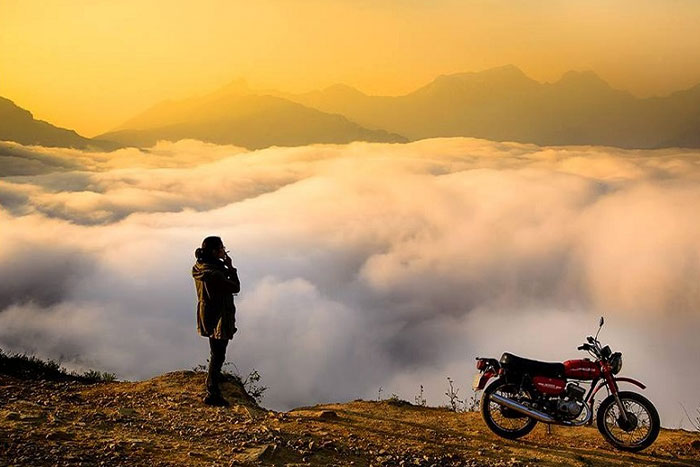
If you plan to grab your backpack for your own Sapa trekking tour from Hanoi, there are various transportation options available. You can choose to travel by bus, private car, or for those who love adventure, a motorbike is undoubtedly the best choice
Upon reaching Sapa, you have the flexibility to visit Lao Chai - Ta Van at your convenience, given its proximity to the town. Starting from the Stone Church at the heart of Sapa town, follow Cau May Street, then make a turn onto Muong Hoa Street. As you proceed along Muong Hoa Valley, you'll be greeted by the charming scenery of verdant terraced fields and charming wooden residences, signaling your entrance into Lao Chải Village. To reach Tả Van Village, you need to travel further as this village is about 12 kilometers away from Sapa town, but it is still located within Muong Hoa Valley.
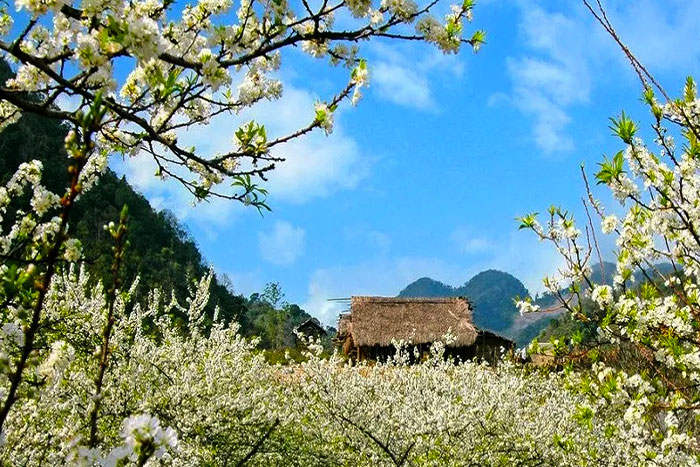
During the exploration of these two village, you can choose between cycling, motorcycling, or driving, each mode of transportation offering its own advantages that suit your needs. However, if you prioritize exploring and enjoying the rustic and poetic scenery of this locality, then motorcycling would be the most suitable choice. Because you can leisurely explore the mountainous forests and green fields while immersing yourself in the fresh air of the countryside.
Take a look at The best way to travel from Hanoi to Sapa
5. What to do on your trip in Lao Chai - Ta Van Village ?
5.1. Admire the terraced rice fields
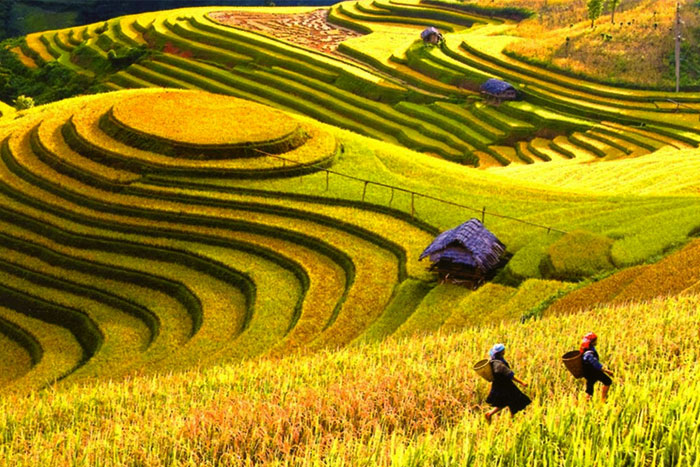
The terraced rice fields in Lao Chai - Ta Van Village are undoubtedly the most captivating feature of this scenic destination. During the pouring water season, from May to June, you can witness water flowing gracefully into the layers of terraced rice fields. These gentle curves form a harmonious mosaic, reflecting the purity of white clouds, the warmth of sunlight during sunrise and sunset, and the grandeur of the mountain ranges.
Conversely, the ripening rice season, from late August to early September, is the prime time to visit the Sapa rice fields. The terraces transform into a sea of golden waves, casting a radiant glow over the mountain slopes and valleys.
5.2. Take part in local life
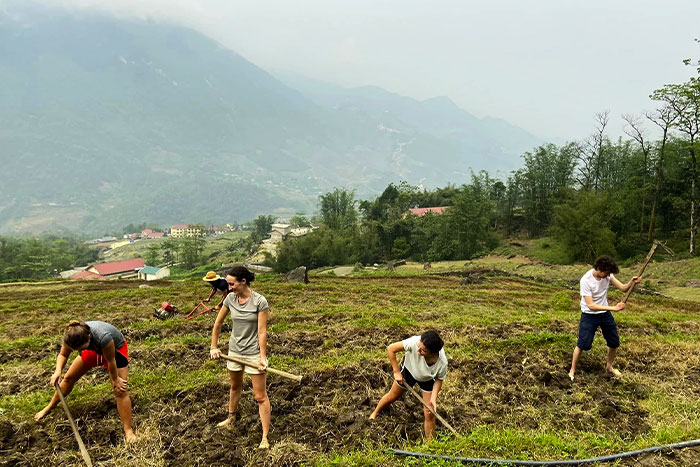
Authentic homestays in this Sapa village provide travelers with a unique opportunity to immerse themselves in the lives of the local communities. With warm hospitality, traditional meals, and cozy accommodations, guests can connect with the friendly residents, creating unforgettable memories.
5.3. Visit traditional markets
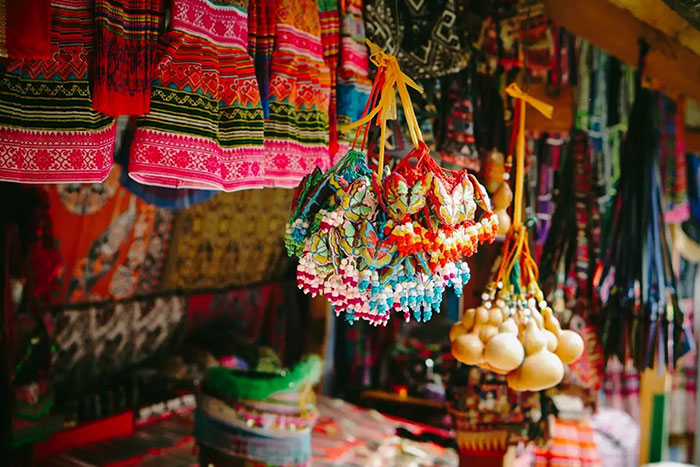
What to visit in Sapa? Exploring the local markets is a must-do in Lao Chai - Tả Van Village. The vibrant ethnic market features traditional costumes, lively handicrafts, and locally crafted items by indigenous artisans. Each item reflects the distinctive style of the local ethnic minority communities, offering a unique cultural experience.
5.4. Take part in local festivals
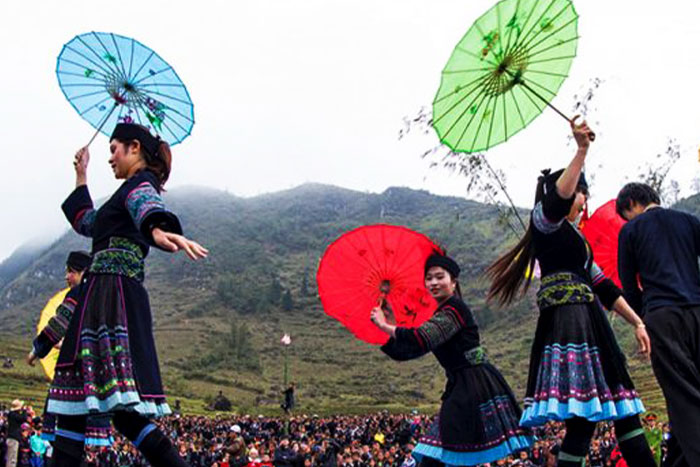
Lao Chải - Tả Van has many festive celebrations in the spring. Traditional folk games, such as swinging and throwing, provide opportunities to create unforgettable memories against the stunning backdrop of Sapa.
What makes the experience even more captivating is the chance to enjoy traditional music and dance performances. As night falls, locals gather around large campfires in the village center, singing and performing traditional dances. This creates a vibrant atmosphere that contrasts delightfully with the daytime tranquility.
5.5. Enjoy local foods in Sapa
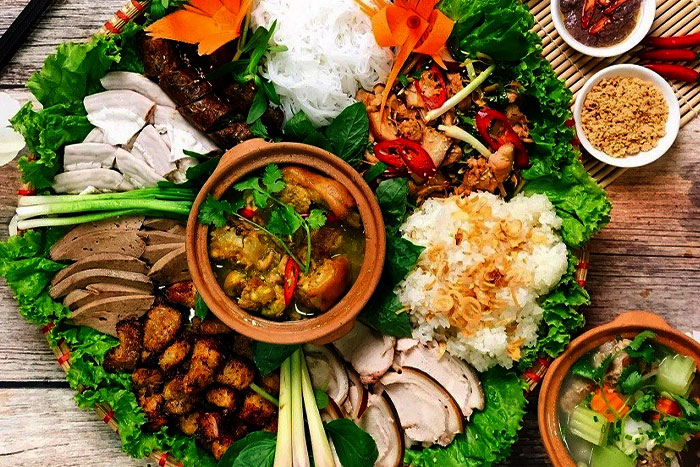
What to eat at Sapa? When exploring Lao Chải and Tả Van villages in Sapa, don't miss the chance to sample a variety of tantalizing Northwest mountain delicacies. Here are some dishes that you should try:
- Thịt lợn cắp nách: Special pork known for its tender and flavorful meat.
- Xôi ngũ sắc: Five-colored sticky rice, offering a delightful blend of textures and tastes, with its hues derived from natural ingredients.
- Thắng cố: A unique Sapa dish made from horse meat and organs, seasoned with aromatic spices.
- Cá suối nướng: Grilled stream fish, prized for its firm, succulent meat and delicate flavor. Pair it with "chẩm chéo," a special dipping sauce, to elevate your culinary experience.
- Gà nướng tiêu xanh: Grilled Chicken with Green Pepper, featuring perfectly grilled chicken with golden skin, fragrant meat, and a delectable green pepper sauce.
6. Helpful tips
To ensure a smooth and enjoyable trip in Lao Chải - Tả Van , remember the following:
- Footwear: Wear sturdy and comfortable shoes, especially if you plan on trekking through the rice terraces.
- Respect Local Customs: Engage with the locals respectfully, ask for permission before taking photos, and adhere to cultural norms to positively impact the community and enhance your experience.
- Local Guide: Consider hiring a local guide to gain deeper insights into the culture, history, and environment, and discover hidden gems.
- Cash and Essentials: ATMs may be scarce, so carry enough cash. Also, pack essentials like a water bottle, sunscreen, and insect repellent.
- Warm Clothing: Pack warm clothing for the evenings, as temperatures can drop sharply at night.
- Advance Booking: Book your homestay or lodging in advance to avoid last-minute hassles, especially during peak seasons.
- Price Awareness: When making purchases or using services, always inquire about prices beforehand to ensure fair transactions and avoid overcharging.
Lao Chai - Ta Van village in Sapa is truly a scenic wonder bestowed by nature. Its majestic mountains and hospitable, friendly residents are sure to leave a lasting impression on you. They will make you appreciate life even more and serves as a perfect getaway from the hustle and pressure of city life. Visiting Lao Chải - Tả Van will be an unforgettable experience! To ensure a satisfying experience far beyond your expectations, please contact Autour Asia, VIETNAM TRAVEL COMPANY now.
Take a look at:
> Sapa 3 days 2 nights itinerary
> Sapa Travel Guide
> Sapa trekking tour from Hanoi
> Sapa tour from Hanoi
> Sapa 3 days 2 nights itinerary
> Sapa Travel Guide
> Sapa trekking tour from Hanoi
> Sapa tour from Hanoi
Related travel guide
Other similar articles
CUSTOMIZABLE BY LOCAL EXPERTS
Personalized trip at the original price!
REFUND GUARANTEE
We believe in our work and promise to give you money back.
GOOD PRICE / QUALITY
95% satisfied more than expected!
24/7 LOCAL SUPPORT
We are always available online to provide assistance at any time.
Most read articles
Autour Asia is highly recommended on
Embracing the mission of "Satisfied more than expected" and providing authentic experiences, we have received numerous recommendations on reputable travel forums:













